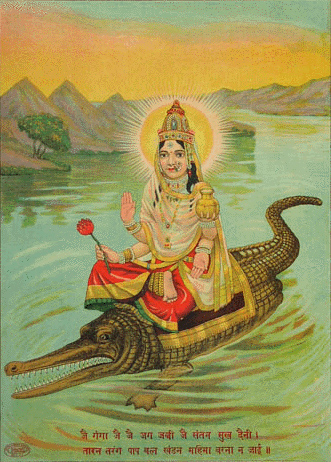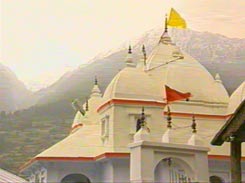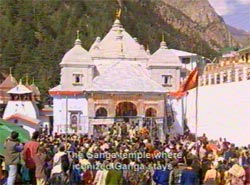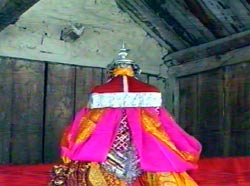

When the Gangotri glacier freezes, when winter sets in, Mother Ganga travels to her winter abode, a few slopes down. She returns on Akshaya Dwitiya. The next day, Akshaya Tritiya, is one of the holiest days in Hindu calendar. It falls in the second half of April. It also marks the beginning of the thawing of ice and the softening of glaciers. The Gangotri temple opens for worship after the winter closure. Ma Ganga’s journey when she goes back to Gangotri is celebrated with rituals, music, dance, procession and worship.
The spiritual journey of Ganga Ma has been documented by numerous Indic videographers, including the Indira Gandhi National Center for the Arts (IGNCA), who produced a documentary entitled ‘Celestial Journey’ from Mukhba to Gangotri'.

This journey has a recorded history of at least 700 years. Beyond this, we do not know for how many centuries this journey had been going on. Mukhba is believed to be Rishi Matang’s place of meditation. Three-four days before the journey, the villagers of Mukhba start preparations. The palanquin to carry the icon of Ganga is decorated with coloured clothes. There are colours that can be and cannot used. Green and red are the predominant colours used.
At the top of the palanquin is the icon of Ganga, adorned with ornaments. The entire village gets busy with activity, preparing for the 25-km trek to Gangotri. Devotees come and take leave of Ganga, praying to her to come again the next year. Always, there are rains before the procession, an auspicious omen
The gods and goddesses from the adjoining villages also come in processions and present themselves before Ma Ganga. Some of them accompany her to the border of their regions. Someshwar Devta, her consort, too comes in an elaborately adorned palanquin. Ganga and Someshwar Devta meet at a point, where there are more celebrations. Persons, sanctified to carry the icons of the two gods dance in ecstasy swinging to the tune of the local musical instruments. The villagers believe that the spirit of the gods gets into them, which makes them swing thus, without falling.

After that both the palanquins start the journey. The procession is led by Someshwar Devta. The Garhwal Scouts (Army band) participate in the ritual and leads the ritual music. Playing the local tune and song, they go over the terrains, followed by the decorated palanquins and devotees. The trek seems arduous, especially to the uninitiated. But for those devotees in the procession, it seems no hardship at all. From Mukhba, to Uttarkashi, to Dharati, it goes on.
On the way, people offer worship to the divine and refreshment and help to the devotees. At the Dharati village border, Someshwar Devta takes leave of Ganga and she continues her journey onward, as if eager to reach her abode at Gangotri. Thus, on the second day of journey, the entourage reaches Gangotri, where the expectant devotees wait to receive Ma Ganga.

After a round of elaborate ritual and worship, the temple doors are opened and Ma Ganga’s icon is taken inside the place. With this, the doors of the Gangotri temple are re-opened to public worship, after the long closure for winter.
Apart from the religious aspect, the whole celestial journey offers cultural and symbolic messages. The temple, which has a tradition of unbroken worship, shifts to Mukhba in winter so that the daily rituals are not missed. By taking Ganga as the daughter of the village, the community strengthens the social bonding. Most of the rituals connected also have symbolic ecological conservation messages.
Source: Indira Gandhi National Center for the Arts